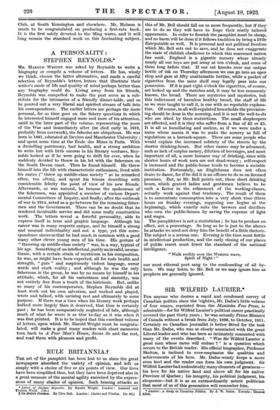RULE BRITANNIA.t
Tax art of the pamphlet has been lost to us since the great newspapers absorbed the variety of opinion, and left us simply with a choice of five or six points of view. Our lives have been simplified thus, but they have been deprived also in a great measure of the mental agility exercised by the expressions of many shades of opinion. Such bracing attacks as this of Mr. Bell should fall on us more frequently, but ff they are to do so they will have to forgo their neatly tailored appearance. In order to flourish the pamphlet -must be cheap, and no harm will be done if it follows tradition by being a little disreputable as well. It is personal and not political freedom which Mr. Bell sets out to save, and he does not exaggerate the state of childish obedience to which this renowned nation has sunk. England is a gigantic nursery where already nearly all our toys are put away at ten o'clock, and some of them long before that. If our cat knocks over our unique bottle of ink on Thursday afternoon' e can go into an open shop and gaze at fifty unattainable bottles, while a packet of cigarettes from the same shelf may legally pass into our possession. If it is past eight o'clock the cigarettes, of course, are locked up and the matches and, it may be less commonly known, the bread. There are mysteries and mysteries, but this 'indictment of harmless healthy bread, the staff of life as we were taught to call it, is one with no reputable explanation. Of course, in all well-regulated households the provisioning should be done in the morning, and it is not the well-to-do who are irked by these restrictions. The small shopkeepers are affected, and it is they who suffer from a fine of £2 or £5. It is all so humiliating and useless, as if we were under a nurse whose mania it was to make the nursery as full of regulations as a barrack-square. There are some people who would explain the increased sobriety of the streets by the shorter drinking-hours. But other causes may be advanced, such as lack of surplus money, dilution of beverages, and most important of all, a more humane way of drinking, since with shorter hours of work men are not dead-weary ; self-respect is increased and the public-house tends to become a sociable institution. Fortunately, an Englishman does not often desire to dance, for if he did it is an offence to do so on licensed premises. But, as Mr. Bell points out, these short drinking hours, which genteel ladies and gentlemen believe to be such a factor in the refinement of the working-classes, actually work against that tendency. The result of them is to concentrate consumption into a very short time (three hours on Sunday evenings, supposing one begins at the beginning), which exactly suits the brewers and distillers who own the public-houses by saving the expense of light and wages.
The pamphleteer is not a statistician ; he has to produce an effect, not a percentage. So long as he is • just to the abuses he attacks we need not deny him the benefit of a little rhetoric. The subject is a serious one. Evening is the time most fertile in intellectual production, and the early closing of our places of public resort must lower the standard of the national intelligence.
" Walk swiftly over the Western wave, Spirit of Night ! "
our most ethereal poet sang to the confounding of all bylaws. We may listen to Mr. Bell or we may ignore him as prophets are generally ignored.


































 Previous page
Previous page